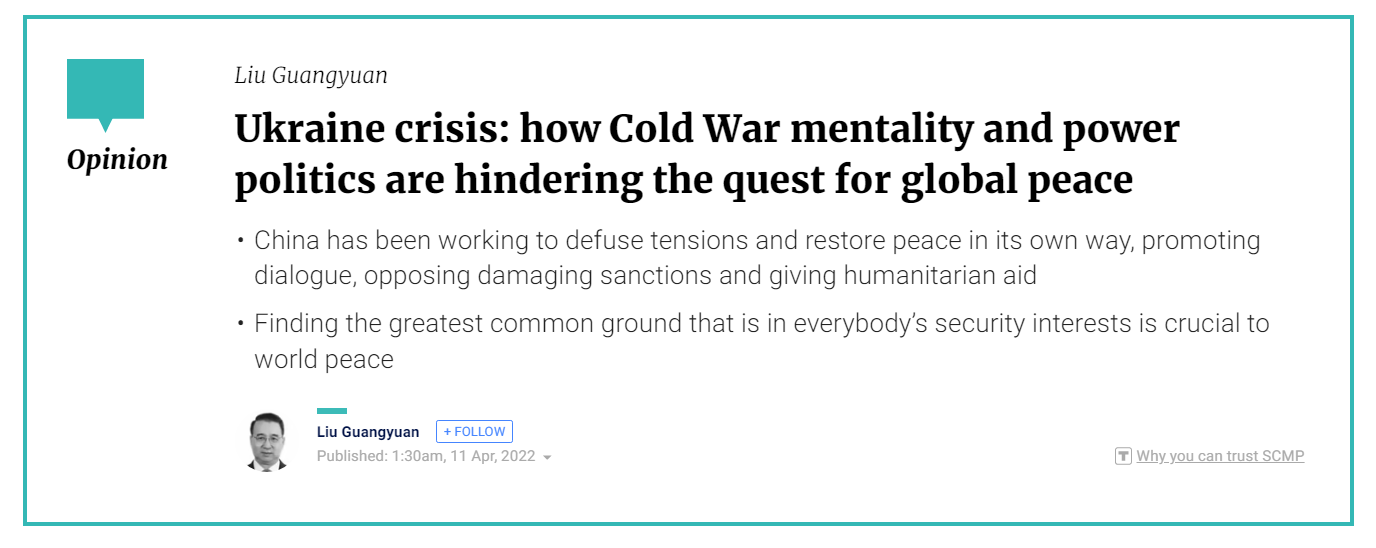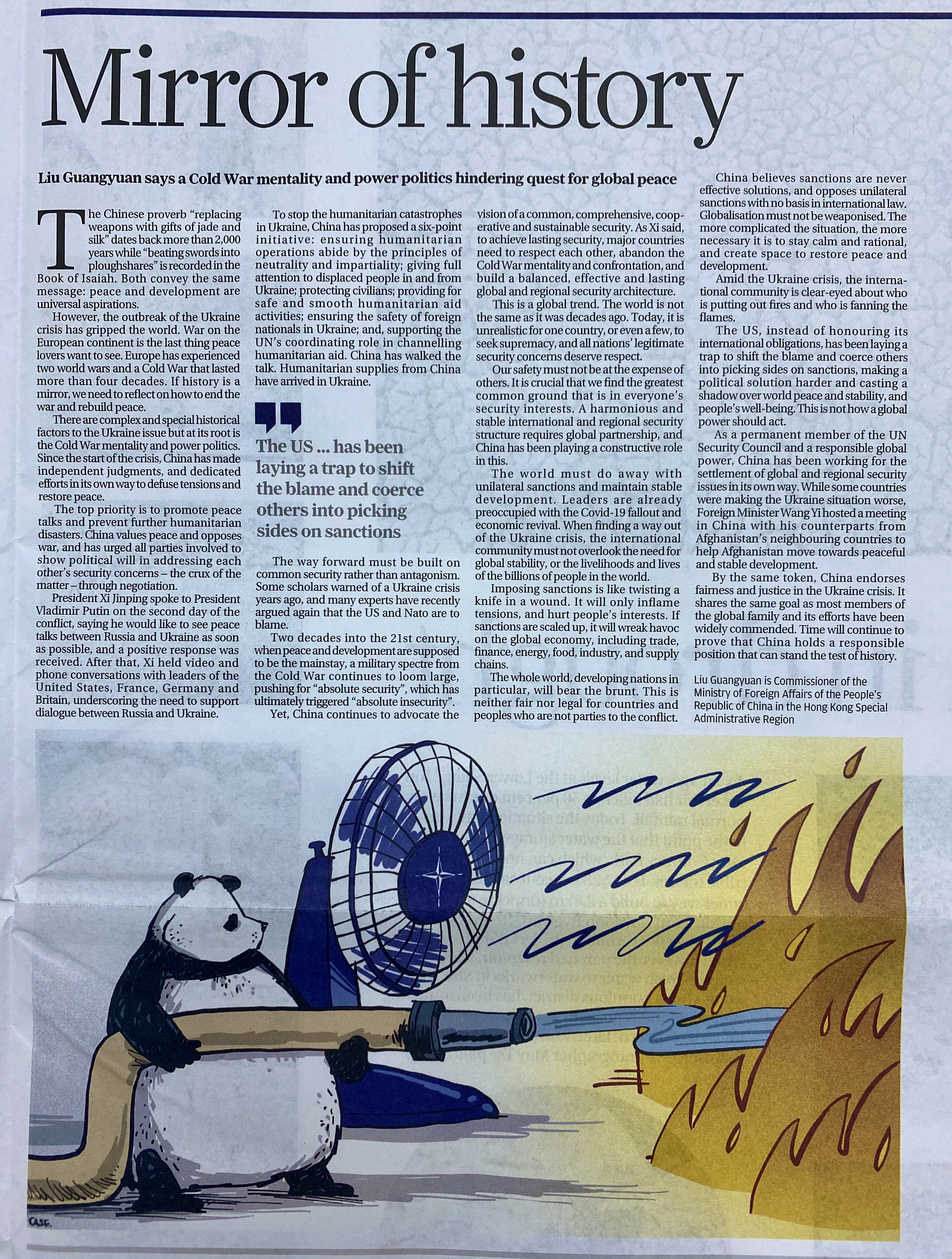2022年4月11日,外交部驻港公署刘光源特派员在《南华早报》发表题为《世界和平与安全需要共同守护》的英文署名文章,介绍中国在乌克兰问题上正义立场,呼吁“当务之急在于加大劝和促谈,防止人道灾难”“根本之道在于坚持共同安全,反对阵营对抗”“世界之责在于摒弃单边制裁,维护稳定发展”,并揭批个别国家拱火浇油的错误行径。文章亦于当日在该报网页版刊登。全文如下:


和平与发展是世界人民的共同期盼。数千年前,在中国春秋时期就有“化干戈为玉帛”的美谈,《圣经·以赛亚书》中也记载着“铸剑为犁”的典故。
然而,近期乌克兰危机爆发,欧洲大陆重燃战火,这是所有爱好和平的国家和人民不愿看到的局面。回望过去,欧洲曾经历两次世界大战和延续40余年的冷战,留下惨痛而深刻的教训。以史为鉴,我们亟需认真反思,更需理性行动——在战争与和平问题上,到底该何去何从?
乌克兰问题有着复杂而特殊的历史经纬,但追根溯源,根子还是冷战思维和强权政治。自危机爆发以来,中方始终从问题本身的是非曲直出发,作出独立自主判断,并一直以自己的方式,为推动局势降温、早日实现和平作出积极努力。
当务之急在于加大劝和促谈,防止人道灾难。中方历来主张和平,反对战争,一直敦促乌克兰危机有关各方展现政治意愿,通过对话谈判解开背后症结,化解安全忧虑。习近平主席在冲突发生第二天就应约同普京总统通话,提出愿看到俄乌双方尽早和谈,得到积极回应。之后习主席又连续与美法德英等国领导人视频会晤或通话,指出各方应该共同支持俄乌对话谈判,谈出结果,谈出和平。中国还就防止乌克兰出现大规模人道主义危机提出6点倡议,包括人道主义行动必须遵守中立公正原则,全面关注乌克兰流离失所者,切实保护平民,保障人道援助活动顺利安全开展,确保在乌外国人安全以及支持联合国在对乌人道援助方面发挥协调作用等。中国不仅是这么说的,也是这么做的。中国援助的多批人道主义物资已运抵乌克兰。
根本之道在于坚持共同安全,反对阵营对抗。不少有识之士若干年前就对这场危机发出过预警,近日很多专家学者再次一针见血指出美北约是乌克兰危机的始作俑者。在和平与发展的21世纪,一个冷战残留的军事集团,非但没有解散,反而不断强化扩大,盲目追求单方面的“绝对安全”,才酿成了今日“绝对不安全”的苦果。
中国古话讲,“己欲立而立人,己欲达而达人”“己所不欲,勿施于人”。中国一直主张,国际社会要坚持共同、综合、合作、可持续的安全观。正如习近平主席指出的,确保安全的长久之道在于大国相互尊重,摒弃冷战思维,不搞阵营对抗,构建均衡、有效、可持续的全球和地区安全架构。天下大势,浩浩荡荡。世界早已不是几十年前的世界了,某一国或几国唯我独尊、唯我独霸是行不通的,各国的合理安全关切都应得到尊重。我们要让自己安全,也要让别人安全,寻求安全利益的最大公约数,共同营造和谐稳定的国际和地区安全环境。中国一直在为此发挥建设性作用。
世界之责在于摒弃单边制裁,维护稳定发展。当今世界既要应对新冠肺炎疫情,又要保经济民生发展,国际社会特别是有关大国在处理乌克兰危机时更要考虑全球稳定和几十亿人民的生产生活。极限制裁犹如抱薪救火、扬汤止沸,只会导致形势更加复杂,矛盾更加激化,损害的只能是民众利益。如果制裁进一步升级,还会引发全球经贸、金融、能源、粮食、产业链供应链等发生严重危机,给世界尤其是发展中国家造成不可挽回的损失。非当事方的国家和人民也要被迫为此埋单,这既不公正,也不合法。中国历来不赞成用制裁手段解决问题,更反对没有国际法依据的单边制裁。全球化不能被“武器化”。形势越是复杂,越需要保持冷静和理性,真心作出努力,为和平创造条件,为发展维系空间。
在乌克兰危机中,谁在真心灭火,谁在有意浇油,国际社会看得清清楚楚。个别国家不但没有履行国际义务,反而不断制造话语陷阱向别国甩锅推责,挥舞制裁大棒,胁迫其他国家选边站队,为政治解决制造更大障碍,给世界和平稳定和民生福祉带来灾难。这绝不是一个世界大国应有的样子。
作为安理会常任理事国和世界上负责任大国,中国一直以自己的方式为妥善解决全球和地区安全问题作出积极努力。正当个别国家为乌克兰危机拱火浇油之时,王毅国务委员兼外长在中国主持召开阿富汗邻国外长会,同地区国家一道努力推动阿富汗走出困境、实现和平稳定发展。中国在乌克兰危机上同样坚定维护公平正义,同大多数国家抱持一致愿望,中方所作的努力已得到国际社会广泛认同。时间已经证明并将反复证明,中国的立场是负责任的,经得起历史检验。
Ukraine crisis: how Cold War mentality and power politics are hindering the quest for global peace
The Chinese proverb “replacing weapons with gifts of jade and silk” dates back more than 2,000 years while “beating swords into ploughshares” is recorded in the Book of Isaiah. Both convey the same message: peace and development are universal aspirations.
However, the outbreak of the Ukraine crisis has gripped the world. War on the European continent is the last thing peace lovers want to see. Europe has experienced two world wars and a Cold War that lasted more than four decades. If history is a mirror, we need to reflect on how to end the war and rebuild peace.
There are complex and special historical factors to the Ukraine issue but at its root is the Cold War mentality and power politics. Since the start of the crisis, China has made independent judgments, and dedicated efforts in its own way to defuse tensions and restore peace.
The top priority is to promote peace talks and prevent further humanitarian disasters. China values peace and opposes war, and has urged all parties involved to show political will in addressing each other’s security concerns – the crux of the matter – through negotiation.
President Xi Jinping spoke to President Vladimir Putin on the second day of the conflict, saying he would like to see peace talks between Russia and Ukraine as soon as possible, and a positive response was received.
After that, Xi held video and phone conversations with leaders of the United States, France, Germany and Britain, underscoring the need to support dialogue between Russia and Ukraine.
To stop the humanitarian catastrophes in Ukraine, China has proposed a six-point initiative: ensuring humanitarian operations abide by the principles of neutrality and impartiality; giving full attention to displaced people in and from Ukraine; protecting civilians; providing for safe and smooth humanitarian aid activities; ensuring the safety of foreign nationals in Ukraine; and, supporting the UN’s coordinating role in channelling humanitarian aid.
China has walked the talk. Humanitarian supplies from China have arrived in Ukraine.
The way forward must be built on common security rather than antagonism. Some scholars warned of a Ukraine crisis years ago, and many experts have recently argued again that the US and Nato are to blame.
Two decades into the 21st century, when peace and development are supposed to be the mainstay, a military spectre from the Cold War continues to loom large, pushing for “absolute security”, which has ultimately triggered “absolute insecurity”.
Yet, China continues to advocate the vision of a common, comprehensive, cooperative and sustainable security. As Xi said, to achieve lasting security, major countries need to respect each other, abandon the Cold War mentality and confrontation, and build a balanced, effective and lasting global and regional security architecture.
This is a global trend. The world is not the same as it was decades ago. Today, it is unrealistic for one country, or even a few, to seek supremacy, and all countries’ legitimate security concerns deserve respect.
Our safety must not be at the expense of others’. It is crucial that we find the greatest common ground that is in everyone’s security interests. A harmonious and stable international and regional security structure requires global partnership, and China has been playing a constructive role in this.
The world must do away with unilateral sanctions and maintain stable development. Leaders are already preoccupied with the Covid-19 fallout and economic revival. When finding a way out of the Ukraine crisis, the international community must not overlook the need for global stability, or the livelihoods and lives of the billions of people in the world.
Imposing sanctions is like twisting a knife in a wound. It will only inflame tensions, and hurt people’s interests. If sanctions are scaled up, it will wreak havoc on the global economy, including trade, finance, energy, food, industry, and supply chains.
The whole world, developing nations in particular, will bear the brunt. This is neither fair nor legal for countries and peoples who are not parties to the conflict.
China believes sanctions are never effective solutions, and opposes unilateral sanctions with no basis in international law. Globalisation must not be weaponised. The more complicated the situation, the more necessary it is to stay calm and rational, and create space to restore peace and development.
Amid the Ukraine crisis, the international community is clear-eyed about who is putting out fires and who is fanning the flames.
The US, instead of honouring its international obligations, has been laying a trap to shift the blame and coerce others into picking sides on sanctions, making a political solution harder and casting a shadow over world peace and stability, and people’s well-being. This is not how a global power should act.
As a permanent member of the UN Security Council and a responsible global power, China has been working for the settlement of global and regional security issues in its own way. While some countries were making the Ukraine situation worse, Foreign Minister Wang Yi hosted a meeting in China with his counterparts from Afghanistan’s neighbouring countries to help Afghanistan move towards peaceful and stable development.
By the same token, China endorses fairness and justice in the Ukraine crisis. It shares the same goal as most members of the global family and its efforts have been widely commended. Time will continue to prove that China holds a responsible position that can stand the test of history.